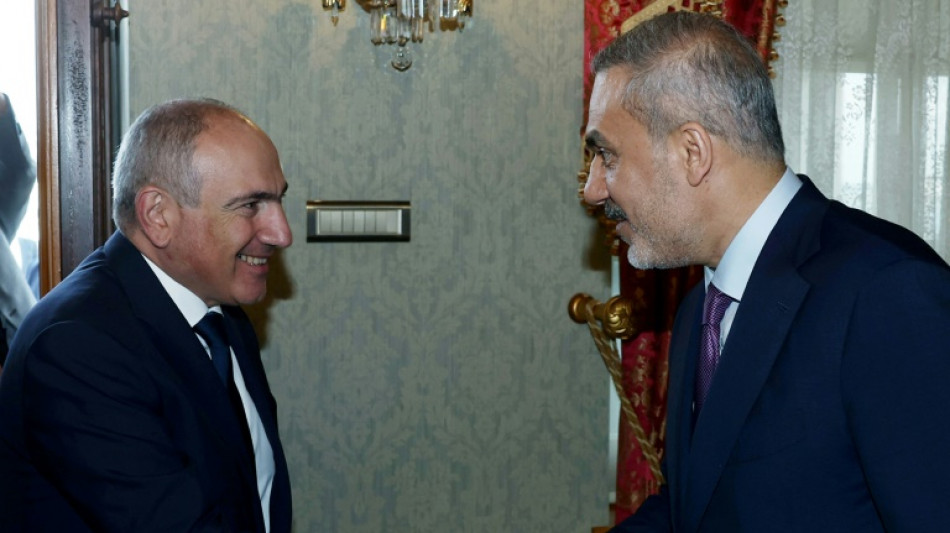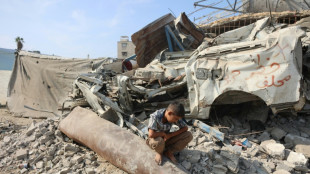

Armenia PM hails 'in depth' talks with Erdogan on 'historic' Turkey visit
Armenian Prime Minister Nikol Pashinyan said he had held "in depth" talks with President Recep Tayyip Erdogan in Istanbul on a rare visit to arch-foe Turkey Friday, in what Yerevan described as a "historic" step toward regional peace.
The talks between the two leaders -- whose nations have never established formal diplomatic ties and whose shared border has been closed since the 1990s -- took place at Dolmabahce Palace and lasted just over an hour, Erdogan's office said.
Erdogan's office said the pair had discussed Armenia's peace talks with Azerbaijan and efforts to normalise ties with Turkey as well as the recent explosion of violence between Israel and Iran, which shares a border with both Turkey and Armenia.
"President Erdogan emphasised the significance of the consensus reached in the ongoing peace negotiations between Azerbaijan and Armenia, given the current circumstances," and said Turkey would continue to "provide full support to efforts aimed at developing the region with a 'win-win' approach".
They also addressed "potential steps to be taken within the framework of the normalisation process between Turkey and Armenia", it said.
Erdogan also told Pashinyan that Turkey was taking "all diplomatic means to ensure stability, not only in the Caucasus but across the entire region", notably engaging with other leaders "to avert the risks" posed by Iran-Israel standoff.
- Normalisation -
In a post on X, Pashinyan said he had an "in-depth exchange" with Erdogan at which they "discussed the Armenia-Turkiye normalisation process, regional developments, and the importance of sustained dialogue".
He reassured the Turkish leader that Armenia was "committed to building peace and stability in our region".
Relations between the two nations have been historically strained over the World War I-era mass killings of Armenians in the Ottoman Empire -- atrocities Yerevan says amount to genocide, a term Turkey rejects -- and further complicated by Ankara's close ties to Azerbaijan, and its support for Baku in its long-running conflict with Armenia.
But Pashinyan's visit sparked unease back home, where police rounded up "several dozen" opposition supporters in the capital Yerevan and beyond, rights groups and a lawyers coalition said.
Ahead of the meeting, Armenian parliament speaker Alen Simonyan told reporters: "This is a historic visit, as it will be the first time a head of the Republic of Armenia visits Turkey at this level."
Azerbaijani President Ilham Aliyev had on Thursday travelled to Turkey to meet Erdogan. He hailed the two nations' "significant" alliance in a meeting at which the Turkish leader reiterated his backing for "the establishment of peace between Azerbaijan and Armenia".
Armenia and Azerbaijan agreed on the text of a peace deal in March, but Baku has since outlined a host of demands -- including changes to Armenia's constitution -- before it will sign the document.
- Pashinyan concession -
Pashinyan has actively sought to normalise relations with both Baku and Ankara.
"Pashinyan is very keen to break Armenia out of its isolation and the best way to do that is a peace agreement with Azerbaijan and a normalisation agreement with Turkey," Thomas de Waal, a senior fellow at Carnegie Europe told AFP.
The main thing blocking normalisation with Turkey was Azerbaijan.
"Turkey has a strategic dilemma here: on the one hand it wants to stay loyal to Azerbaijan; on the other, opening the Armenian border makes it a bigger player in the South Caucasus," he said.
Opening the border would help the economy in eastern Turkey, diminish Russian influence and likely improve Ankara's ties with Washington and the West, among other things, he said.
"Pashinyan by himself won't make this happen, it's only when it moves higher up the Western agenda with Turkey that you might see change."
Earlier this year, Pashinyan said Armenia would halt its campaign for international recognition of the 1915 mass killings of Armenians as genocide -- a major concession to Turkey that sparked widespread criticism at home.
He has visited Turkey only once before, for Erdogan's 2023 inauguration.
Ankara and Yerevan named special envoys in late 2021 to lead a normalisation process, a year after Armenia's defeat in a war with Azerbaijan over the disputed Karabakh region. A year later, Turkey and Armenia resumed commercial flights after a two-year pause.
Ch.Schroeder--RTC



